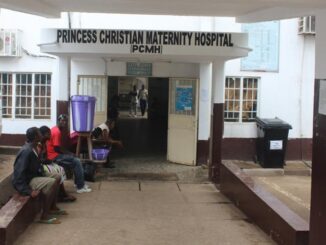
BY ALIMAMY LAHAI KAMARA :
Since 1996, political administrations in Sierra Leone tend to produce a peculiar disposition strange to post 1996 governments – a political attitude that seems to abhor corruption. The Truth and Reconciliation Commission (TRC) Report notes corruption as one of the factors that plunged this country into the abyss of a bloody civil war. The 1996 government of Ahmed Tejan Kabba, given its political and social misadventures, instituted a legislative and regulatory framework as a starting point to tackling graft.
Kargbo (2011:221) observes that president Kabba took a giant step in the fight against corruption by enacting an anti-corruption act in 2000, bringing into existence the Anti-Corruption Commission.
The 2000 Act was amended and replaced with the 2008 Act under the Ernest Bai Koroma government, conferring prosecutorial powers on the Commission.
Political attitude towards corruption, more than anything else, seems to identify a government as a government that will score a political success or earn a political failure. This understanding finds basis in the argument that achievement in all the goals set out in the PRSP I, PRSP II, Agenda for Change and Agenda for Prosperity – the country’s former blueprint for economic recovery, social development, and political maturity – hinged on the fight against corruption. There has to be an integrated approach where duty bearers initiate measures to strengthen administrative best practices in order to eliminate ‘intended and unintended wastage’ arising in the implementation of development programmes. Take for example in the manifesto of the government of the Sierra Leone Peoples Party (SLPP) entitled New Direction goals such as improving energy and improving transport. The key objective of the former is investment and domestic electrification and the latter movement of people and goods – achievement of which depends on enhancing a corrupt free environment for investment and for resource mobilization.
No way will Sierra Leone provide constant electricity for its people without stamping out corruption at procurement for the very machines churning out electricity; and enforcing clean payment of bills by establishment, business, and domestic consumers for the very power they consume. No way will Sierra Leone make progress in infrastructural development when capital projects are overpriced three times or more than their usual cost – the unimaginably grandiose kickbacks plugged off find their way under the belt of the ‘big man’. And the effect of corruption, tenuously though, is in this narrative: “there is no place like Sierra Leone, where a man in a uniform thin to the bone, stops a man in the street and in god-fearing groan begs for cash or bread or for transport back home,” (quoted in TRC, Vol. 2:149). An excruciatingly debilitating condition!
At this juncture, I wish to link the New Direction with the fight against corruption and attempt to appreciate how it can serve as a pillar for the National Anti-Corruption Strategy (NACS). NACS is a document informing and directing the fight against corruption in Sierra Leone. The New Direction though is the manifesto of the Sierra Leone Peoples Party which embodies hopes and aspirations of the people of Sierra Leone and seeks to deliver on them. Whereas the New Direction contains broad aspirations to deliver on economic and social trajectory, NACS encapsulates streamlined approaches and targeted measures to achieving the said aspirations. Whereas the New Direction aspires to provide the impetus for driving actions, NACS identifies system weaknesses in MDAs and recommends mechanisms for overhaul. Whereas the New Direction seeks to provide a conducive environment for the fight against corruption; NACS mobilizes personnel, formulates partnerships, develops policies, integrates approaches; and channels resources for administering integrity in the workplace, compelling adherence to laid down policies, stimulating interest in the fight, and instituting punitive measures for breaking administrative procedures. In essence the New Direction is the political will.
NACS recognizes political will as crucial and describes it as the most important element of an effective anti-corruption strategy. Without political will at the highest level, NACS says it is almost impossible to combat corruption effectively. In this regard, the New Direction must be devoted to make public commitment to driving initiatives that account for expression of political will.
The concept of political will is a fluid one that underpins institutional aspirations to deliver on set goals. Brinkeroff (2000) understands political will to be commitment of actors to undertake actions or achieve a set of objectives and to sustain the cost of those actions over time. The New Direction highlights several proposed actions for implementation under the caption ‘Fighting Corruption and Improving Accountability’, and I shall focus on asset declaration. It aspires to review the AC Act to expunge the secrecy clause in respect of asset declaration. In essence it seeks to make asset declaration public.
The debate to make asset declaration public has become more intense in the last ten years in countries across Africa, and the lead drivers of this discourse are civil society organizations (CSOs). It will be too early to say their advocacy may have fallen on deaf ears. The belief CSOs hold is that the degree of political will varies from one government to the other; therefore, continuity in mounting advocacies in successive political dispensations can result in a success much as it may result in a failure.
Ghana, South Africa, Kenya, Senegal, Uganda, Tanzania, including Liberia, and Sierra Leone have enacted laws that address corruption. Sections in these laws speak to asset declaration. For example in Sierra Leone, Part VIII of the Anti-Corruption Act of 2008 deals with Integrity in Public Life, encompassing declaration of assets, incomes, and liabilities. But CSOs will still demand more from political authorities, in spite of impressive anti-corruption legislative frameworks in the continent, which in this respect will urge for asset declaration to be made public. Political authorities continue to find it unattractive, perhaps reprimanding, the decision to make asset declaration public. This attitude tends to support the view that there is a lack of institutional political will. Heads of state are largely surrounded by people opposed to public scrutiny and public accountability, or who in themselves lack vitamins of morality and self-probity.
In the last ten years or so, some heads of state have displayed and continue to evince a political attitude that exhibits commitment to the fight against corruption, attracting wide attention both at home and abroad about their desires to eliminate suspicion of bribery and action to stamp out rumours of malfeasance around their administrations. They have not only opened their wardrobes for public viewing, but have insisted that their cabinets and other senior administrative staff unlock their closets. For example, Ellen Johnson Serleaf, Macky Sall, and John Magufuli, colleagues of former President Ernest Bai Koroma, stunned Africa – mustered the political attitude to make their asset declarations public. A departure from the state of affairs in the continent! This disposition may not account for a rounded success or achievement in their efforts to tackle the bane, but does represent an act unpleasant and fatalistic to many of their counterparts in Africa, including Sierra Leone.
However, the New Direction of President Maada Bio aspires to offer new path, fresh hope, and renewed interest directing the political course in the fight against corruption. It aspires to provide the political will – creating an environment for public disclosure of assets, incomes and liabilities; and setting the tone and pace for evaluating progress, identifying opportunities, and overcoming challenges.
The broad goals on socio-economic trajectory carved out in the New Direction will be achieved when the fight against corruption is understood by public and non public officers, and is implemented alongside development programmes, and in the delivery of services.




